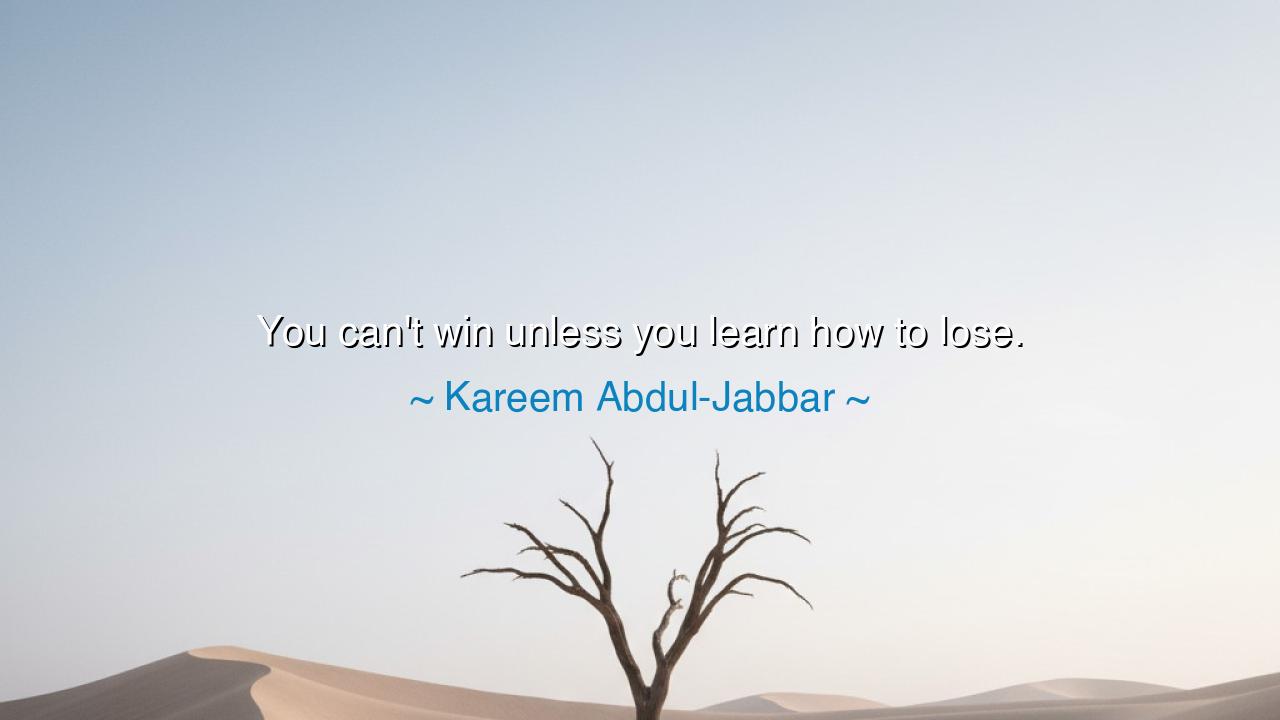
You can't win unless you learn how to lose.






In the wisdom of the ancients it was often said: no man may ascend to the summit who has not first wandered through the valley. So too does the great athlete Kareem Abdul-Jabbar declare: “You can’t win unless you learn how to lose.” These words, though simple, strike the heart like a bell, echoing the eternal truth that victory without the memory of defeat is shallow, and triumph without humility is fleeting.
To lose is to meet the face of one’s own weakness. It is to be stripped bare of illusions, to be confronted with the gap between what we desire and what we have achieved. The ancients would call this a sacred trial, for in the ashes of defeat a man must choose: will he break under shame, or will he gather the fragments of his strength and forge himself anew? This is why losing is a teacher, harsh but faithful, preparing the soul for the rare sweetness of victory.
Look to the life of Abdul-Jabbar himself. Before he became one of the greatest champions in the history of basketball, he endured the humbling of missed shots, lost games, and the sting of being outmatched. Yet in every loss he discovered the road to growth—adjustments in training, resilience of mind, and the patience to improve. Thus when the crown of triumph was placed upon his head, it rested not on the fleeting luck of fortune, but upon the solid foundation of lessons carved from defeat.
History too testifies. Recall the tale of Abraham Lincoln, who failed in business, lost elections, and tasted bitter defeats in his early years. Yet each loss tempered him like iron in the forge, until at last he was prepared for the greatest trial of all: to lead a nation through civil war. Had he not first learned from failure, he could not have borne the terrible weight of history. His ultimate victory—the preservation of the Union—was born from the wisdom of his many losses.
This quote, then, is no jest but a summons: embrace your failures, do not flee from them. For it is in the wrestling with defeat that you learn discipline, patience, and humility. These are the very stones upon which true victory is built. Without them, triumph is a hollow shell, easily broken by the next storm. With them, victory becomes lasting, rooted in the deepest soil of the spirit.
Therefore, the lesson is clear. Do not curse the day of your defeat. Receive it as a stern teacher. Record what it shows you—your weaknesses, your errors, your blind spots. Use it as a map to guide your next attempt. Let each loss be the seed of your next victory, and you will rise not merely as a conqueror of others, but as a master of yourself.
In your daily walk, practice this: when you stumble, pause to ask, “What has this taught me?” When you fail, do not sink into bitterness, but turn your face toward the horizon of growth. And when you triumph, remember the lessons of defeat, lest pride lead you astray. For truly, my children, you cannot win unless you first learn how to lose—and those who master this truth shall find a crown that endures beyond the fleeting applause of men.






AAdministratorAdministrator
Welcome, honored guests. Please leave a comment, we will respond soon